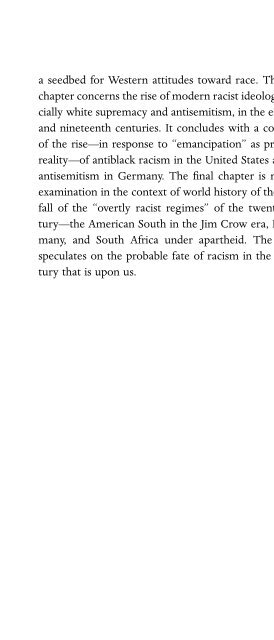Racism - A Short History - George M Fredrickson.pdf - WNLibrary
Racism - A Short History - George M Fredrickson.pdf - WNLibrary
Racism - A Short History - George M Fredrickson.pdf - WNLibrary
You also want an ePaper? Increase the reach of your titles
YUMPU automatically turns print PDFs into web optimized ePapers that Google loves.
ONE Religion and Invention of <strong>Racism</strong><br />
Canarians, thought now to have been of pre-Islamic North<br />
African or Berber stock, were at first regarded as “wild<br />
men” and enslaved. But the church protested that reducing<br />
such “innocent” pagans to servitude hindered their conversion,<br />
and the surviving indigenes were eventually freed,<br />
converted, and successfully assimilated through intermarriage<br />
into the Spanish settler population. 37<br />
It is significant that when Columbus recorded his first<br />
encounter with Native Americans, he described them as<br />
being similar in color to the Canary Islanders. He also manifested<br />
the bifurcated image that would characterize European<br />
perceptions of Indians for centuries to come. Those<br />
Indians who greeted him with apparent friendliness were<br />
viewed as simple children of nature who would be receptive<br />
to tutelage in civilization and Christianity. But the hostile<br />
Indians from islands other than the ones on which Columbus<br />
first landed were written off as “cannibals” who must<br />
be subdued by force or exterminated. Thus was born the<br />
dichotomy of the Indian as either a noble savage who could<br />
be civilized or a wild beast who could at best be tamed and<br />
at worst should be exterminated. 38<br />
The great debate between Juan Ginés de Sepúlveda and<br />
Bartolomé de Las Casas that took place in Valladolid in<br />
1550 might be viewed as a dispute over which of Columbus’s<br />
initial impressions was the more accurate and generalizable.<br />
The critical question was whether Indians possessed<br />
reason, which was taken as the essential indicator of<br />
whether they should be accorded full human status. Sepúlveda,<br />
applying Aristotle’s conception of “natural slavery”<br />
to all native Americans, argued in effect that Indians<br />
were nonrational beings who could be made useful to the<br />
36
















